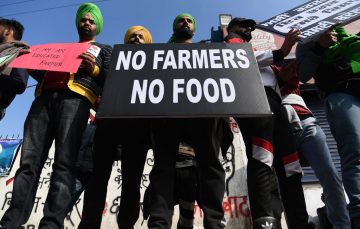
India’s farmers protest with the intentions of making the Indian Government, led by Prime Minister Narendra Modi, to override a set of policies regarding pro-market agriculture that passed this summer. The protests are referred to as the “Dilli Chalo” or Go to Delhi movement, and started on August 9, 2020 and are ongoing.
Protestors arrived with tractors and trailers, some traveling long distances to block the roads of India’s capital, New Delhi. The farmers are protesting the newly established laws that would, among other things, deregulate the sale of crops.
Some footage from Indian television news sources displayed protesters throwing rocks at the police, while the police teargassing some of the protestors. However, there are other parts of the protest that have been very peaceful, with no violence involved.
In response to protests, Prime Minister Modi remarked, “I want to tell the people of India, and our farmers, standing here on the banks of the river Ganges in the holy city of Varanasi, that we are working, not with deceit, but with intentions as pure as holy water.”
Meva Singh, a farmer who owns a small land lot in Northern India, commented, “Our land is our mother. It was passed on to us from our parents, who got in from their parents, and now Modi wants to acquire it and give it away to his rich friends.” Mr. Singh believes that the intentions of establishing this new policy is to take land away from the local farmers, to give it to larger multinational corporations.
Junior at AISG Savyasachi S. states that, “Farms are private property, so how can a company take control of these farms. The companies will still need labor to produce the crops, thus the farmers will still be needed. The companies will have to pay salary to the farmers, so they will still be given a living wage.”
Modi’s head lieutenants have convened and announced to the farmers that they were open for negotiations. Modi’s administration stated that they would not talk to protesting farmers until they stop blocking the roads of New Delhi.
However, the farmers have claimed to not move their vehicles until the negotiations start. The farmers gathered supplies such as food, water, firewood and medical care, to last them a few weeks on the road of New Delhi or however long it takes until Modi retracts the policies.
The meeting that had been scheduled with the Agricultural Minister, Narendra Tomar, on December 9 was cancelled to give protesting farmers a chance to look over the offers given by the government. Despite the proposal stating that the government would amend the laws, the protectors were not satisfied as they desired a complete withdrawal of the law.
Agriculture in India has been a politically controversial topic for the longest time. Almost 60% of India’s population depend on agricultural earnings and is the largest source of income in the country.
Freshman at AISG Vishesh B. remarks that, “If bigger companies were to buy land it would be good for India’s economy. The farmers are not going to produce that much food by themselves because there is a limit to their resources and how much they can produce in masses.“
Despite the heavy dependency the agricultural sector is underdeveloped, with India having one of the world’s highest suicide rates among farmers. According to Business Today, as of 2015, India was one of the world’s fastest-growing economies, yet through the span of 2020, it has been one of the slowest ones.